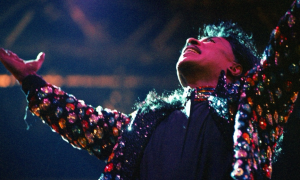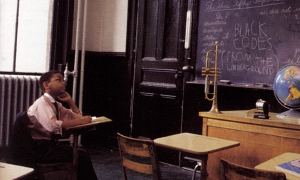Home » Jazz Articles » Opinion » Remembering Bobby Short: The Intimate Enthusiast
Remembering Bobby Short: The Intimate Enthusiast
Mr. Short, and his influences and followers, were not simply concerned with being impressive, but expressive.
 The most common buzzwords writers have used to describe the death of America's premier male cabaret singer, Bobby Short who died of leukemia today, were words like "sophistication and "elegance. However, I would like to qualify the use of these words. Short, with his crisp enunciation, exquisite sartorial taste, sharp wit and polished interpretations of classic popular song certainly epitomized the upper-class glamour listeners associate with New York cabaret. But I fear that these terms sound too intimidating and almost position Short as stuffy or inaccessible, which was hardly the case.
The most common buzzwords writers have used to describe the death of America's premier male cabaret singer, Bobby Short who died of leukemia today, were words like "sophistication and "elegance. However, I would like to qualify the use of these words. Short, with his crisp enunciation, exquisite sartorial taste, sharp wit and polished interpretations of classic popular song certainly epitomized the upper-class glamour listeners associate with New York cabaret. But I fear that these terms sound too intimidating and almost position Short as stuffy or inaccessible, which was hardly the case. I never got to see Mr. Short live but I have long enjoyed his recordings, including those recorded for Atlantic Records in the 50s and 60s and more recent recordings at Telarc Jazz. Arguably the words that best describe Short, alongside sophistication, elegance and class are words such as intimate, passionate and enthusiastic. The most outstanding aspect of Short's music, was his apparent love for what he sang. Short occasionally recorded rock era songs ranging from "Both Sides Now to "Send in the Clowns to "Evergreen. But his love affair with classic popular song, especially that of Cole Porter, George and Ira Gershwin, Vernon Duke, Duke Ellington, Rodgers and Hart, which he seemed to have encyclopedic knowledge of, was his chief love affair. Short's intimate singing, conveyed through his crisp voice and crystal clear diction demonstrated a vast command of tone and dynamics with a gravitational pull. Listening to him you couldn't help but fall in love with palpable emotion and intricate songcraft of the great songwriters his singing honored.
Mr. Short was not a jazz singer per se, but he, like Mabel Mercer and Sylvia Syms, was a singular interpreter of songs who was most easily classified as part of the cabaret tradition but was too distinct to be narrowly confined by the term. Jazz fans often associate cabaret singing with melodramatic stylization, cheeky nostalgia, arch irony and/or artificial performance art. But the best cabaret singers, including Mercer, Syms, Short and the late Susannah McCorkle transcended such stereotypes and had much to teach singers of any genre. Notably they were soul singers in the truest sense, able to penetrate the emotional depths of their material and translate it with a perfect marriage of narrative immediacy and rhythmic and melodic skill. Mr. Short, and his influences and followers, were not simply concerned with being impressive, but expressive. Beyond the swank settings and cultural cache associated with cabaret, these singers were trying to tell their audiences something about the poignancy of memory and distill the truth in their songs to generate an emotionally resonant experience.
Though Mr. Short is no longer with us we can still enjoy him on record. Mr. Short first recorded LPs for Atlantic Records in 1955 when rock and roll and youth-oriented music was gaining commercial momentum. Short's brand of intimate singing never crossed him over to radio or the bestsellers charts. However, despite his lack of commercial sales, most of his recorded catalog is readily available for purchase. Since the late 80s Atlantic Records and the re-issue label Collectables have reissued his catalog on double-CD compilations. Some of his recordings, including the Atlantic Records compilations 50 by Bobby Short and Bobby Short Is K-RA-Z-Y for Gershwin, are out-of-print but if you search hard enough you can find them. Short's records are usually located in either the "Vocal or "Jazz sections of brick-and-mortar and online retailers.
 Cabaret is best experienced live and while recordings rarely capture the energy of live performance, especially in a genre where the tiniest of gestures are often as important as the songs to conveying the full experience. Still, there are several fine live recordings of Mr. Short which provide a taste of his enduring style. His 1968 and 1969 concerts at Town Hall on a bill with cabaret queen Mabel Mercer, Mabel Mercer & Bobby Short at Town Hall and Second Town Hall Concert are available on a two-disc set reissued from Collectables Jazz Classics. Serving almost as a de-facto greatest hits package Short's sense of humor, audience rapport and abundant gifts as a storyteller are evident here. Recorded over 20 years later his enduring style is well captured on the 1991 set Late Night at the Café Carlyle on Telarc Jazz. For a good sampling of Mr. Short's recording output in the 1990s a wise purchase is How's Your Romance a 1999 Telarc Jazz compilation comprised of songs from his 90s albums Late Night, Swing That Music, Songs of New York and Celebrating 30 Years at the Café Carlyle. In addition to his recordings Mr. Short has also made numerous film appearances including Hannah and Her Sisters and Splash. Two video recordings of his performances at the Café Carlyle are also available for purchase, though once again you may have to do some searching. Finally, Mr. Short wrote two autobiographies which provided interesting glimpses into his childhood, his life as a struggling performer, his deft handling of everything from racism to noisy audiences and his exposure to art, language, literature and fashion.
Cabaret is best experienced live and while recordings rarely capture the energy of live performance, especially in a genre where the tiniest of gestures are often as important as the songs to conveying the full experience. Still, there are several fine live recordings of Mr. Short which provide a taste of his enduring style. His 1968 and 1969 concerts at Town Hall on a bill with cabaret queen Mabel Mercer, Mabel Mercer & Bobby Short at Town Hall and Second Town Hall Concert are available on a two-disc set reissued from Collectables Jazz Classics. Serving almost as a de-facto greatest hits package Short's sense of humor, audience rapport and abundant gifts as a storyteller are evident here. Recorded over 20 years later his enduring style is well captured on the 1991 set Late Night at the Café Carlyle on Telarc Jazz. For a good sampling of Mr. Short's recording output in the 1990s a wise purchase is How's Your Romance a 1999 Telarc Jazz compilation comprised of songs from his 90s albums Late Night, Swing That Music, Songs of New York and Celebrating 30 Years at the Café Carlyle. In addition to his recordings Mr. Short has also made numerous film appearances including Hannah and Her Sisters and Splash. Two video recordings of his performances at the Café Carlyle are also available for purchase, though once again you may have to do some searching. Finally, Mr. Short wrote two autobiographies which provided interesting glimpses into his childhood, his life as a struggling performer, his deft handling of everything from racism to noisy audiences and his exposure to art, language, literature and fashion.
During his lifetime Mr. Short sang at the White House on numerous occasions, was nominated for three Grammy Awards and has remained a certified legend among cabaret fans and lovers of traditional popular song for decades. Though he represented a bygone era of sophistication, elegance, and glamour he may be best remembered for his passion, intimacy and enthusiasm. You did not have to see Mr. Short in-person to appreciate these qualities; they endure in the songs he sang and his essential recordings.
Comments
Tags
For the Love of Jazz
 All About Jazz has been a pillar of jazz since 1995, championing it as an art form and, more importantly, supporting the musicians who create it. Our enduring commitment has made "AAJ" one of the most culturally important websites of its kind, read by hundreds of thousands of fans, musicians and industry figures every month.
All About Jazz has been a pillar of jazz since 1995, championing it as an art form and, more importantly, supporting the musicians who create it. Our enduring commitment has made "AAJ" one of the most culturally important websites of its kind, read by hundreds of thousands of fans, musicians and industry figures every month.




















